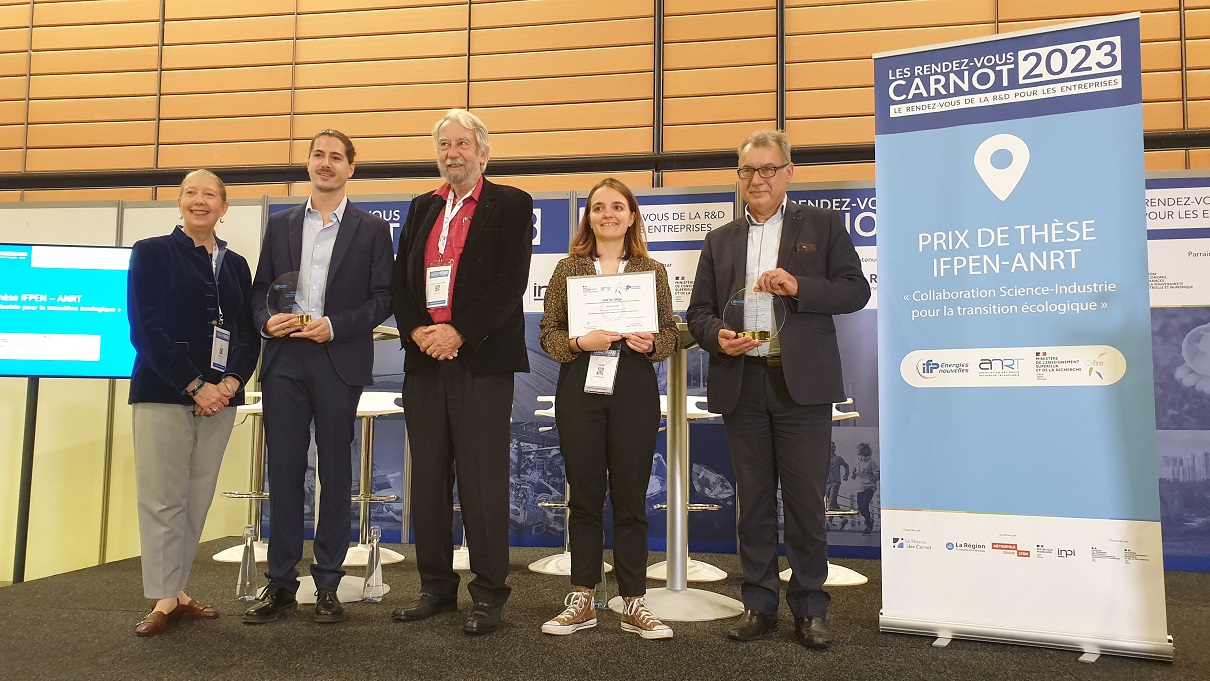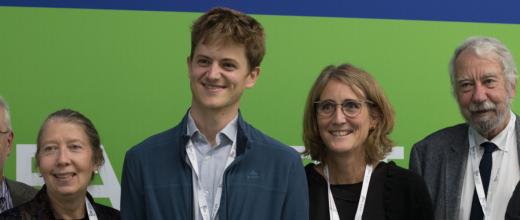19.10.2023
3 minutes of reading
On 19 October, the second edition of the IFPEN-ANRT thesis prize awards ceremony honored two candidates: Julie Figueras for her thesis entitled “Biomethanation of syngas, kinetic study and pilot scale implementation”, and Raphaël Billot for his thesis entitled “Amélioration et mise en œuvre d’enzymes bloquant le quorum sensing bactérien pour des applications biotechnologiques” (Improvement and implementation of quorum quenching enzymes for biotech applications).
In 2022, IFPEN and the ANRT (French National Research and Technology Association) joined forces to create a thesis prize dedicated to “Science-Industry collaboration for the ecological transition”. The Prize is awarded each year to a young recipient of a doctorate whose thesis research was conducted within the context of an industrial agreement for training through research (CIFRE) in conjunction with an SME, and which has had beneficial applications in terms of reducing the environmental footprint of human activities across all sectors, as well as the quality and durability of the SME’s collaboration with the academic world.
The 2023 IFPEN-ANRT thesis prize, which this year honored research conducted by Julie Figueras and Raphaël Billot, was awarded by Clarisse Angelier, general delegate of the ANRT, Pierre-Franck Chevet, president of IFPEN, and Olivier Appert, member of the Academy of Technologies, on October 19, at a ceremony held during the 2023 Rendez-vous Carnot event.

Thesis prepared by Julie Figueras: biogenic methane production on a pilot scale
Julie Figueras prepared her process engineering thesis at Lyon University’s doctoral school of chemistry. Conducted within the context of an industrial agreement for training through research (CIFRE) between the DEEP Laboratory (dedicated to waste, water, the environment and pollution) (Lyon, INSA) and Enosis, it was jointly supervised by Pierre Buffière, Hassen Benbelkacem (DEEP) and Stéphane Palmade (Enosis). The objective was to optimize Enosis’ bio-methanation process with syngas as a raw material, primarily made up of CO and H2, obtained by pyro-gasification, and the challenge was to develop a microbial community with the capacity to convert the syngas into methane in intensive conditions. The research successfully addressed the problem thanks to the specialization, in a pressure reactor, of a microbial community that demonstrated excellent methane production performances as well as significant CO tolerance.
« Thanks to Cifre, we had access to the DEEP laboratory’s expertise and technical resources. Moreover, the duration of the thesis made it possible to tackle a fundamental problem that required time. This mechanism is an effective bridge enabling a PhD student to navigate between the worlds of research and industry. »
Stéphane Palmade, Associate and Technical Director, Enosis
Enosis is a biotech company created in Toulouse in 2014. It offers equipment for recycling CO2 and transforming it into renewable gas, which can be used as a substitute for natural gas in all its applications: fuel, production of heat and electricity, a raw material for industry. To convert CO2, Enosis uses bio-methanation, an innovative biological technique based on microorganisms. This solution is intended to serve as a bridge between electric and gas networks (using a “Power-to-Gas“ architecture), making it possible to store surplus electricity alongside other solutions, such as batteries.
Thesis prepared by Raphaël Billot: enzymes to tackle bacteria
Raphaël Billot carried out his thesis in the field of structural biochemistry at Aix-Marseille University’s doctoral school of Life Sciences and Health. Conducted within the context of an industrial agreement for training through research (CIFRE) between the MEPHI (Microbes Evolution Phylogeny and Infection) laboratory and Gene&GreenTK, it was jointly supervised by Eric Chabrière (MEPHI) and David Daudé (Gene&GreenTK). The research was aimed at improving enzymes with the capacity to inhibit the quorum sensing mechanism within bacterial populations. The latter is a method of communication used by bacteria to coordinate actions such as virulence and biofilm formation.
Nine screening methods were optimized to identify the best enzyme variants, and then hundreds of variants were generated, making it possible to isolate a drastically improved variant as compared to the original enzyme. The resolution of its three-dimensional structure using X-ray crystallography elucidated how the enzyme recognizes its target and made it possible to identify the molecular determinants responsible for its efficiency. Lastly, the capacity of the enhanced enzyme to disturb the numerous behaviors of a model bacterial strain, such as its capacity to form a biofilm or produce antibiotics, was demonstrated.
« The Cifre initiative represents a genuine lever for a small company to offer employment to young people, as we were able to do in this case once the student had defended his thesis. Moreover, the success of the thesis has paved the way for new collaborations. For example, a PRCE (Collaborative Research-Company Project)-type ANR project has been initiated by Gene&GreenTK in partnership with two academic laboratories to further improve the activity of the enzyme and demonstrate its potential for sustainable plant protection. »
David Daudé, President and Scientific Director, Gene&GreenTK
Gene&GreenTK is a start-up created in 2013 and incubated within the IHU Méditerranée Infection university hospital institute, which harnesses enzyme biology to improve human, animal and plant health. Early on, some enzymes discovered in the hot springs of Vesuvius proved to be good candidates for decontaminating neurotoxic agents such as sarin. The company is continuing its projects in this field, while at the same time exploring other research avenues, particularly with a view to optimizing the efficiency of enzymes to tackle bacteria and provide sustainable alternatives to antibiotics and pesticides.







